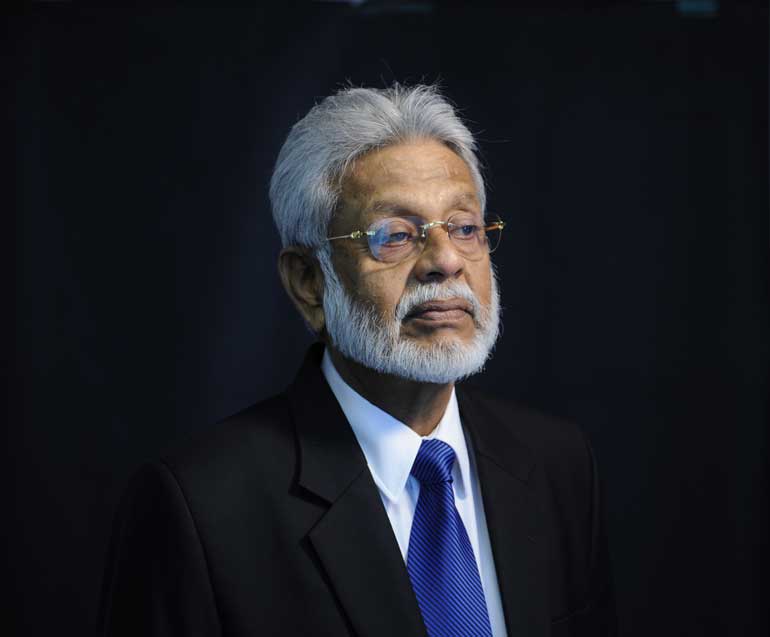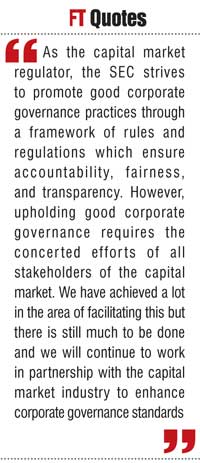Sunday Feb 22, 2026
Sunday Feb 22, 2026
Thursday, 25 June 2015 00:00 - - {{hitsCtrl.values.hits}}

SEC Chairman Thilak Karunaratne
The capital market is considered a vital conduit for long-term fund mobilisation and a key driver of economic growth. As the capital market regulator, our focus is to facilitate a fair, efficient, orderly and transparent market, in which issuers can raise funds with adequate safeguards provided to protect investors. Hence, the regulatory framework of the securities market has been designed to fulfill this mandate and ensure a reliable price discovery mechanism, reasonable market access to all investors, prompt action to contain market failures and timely and efficient dissemination of market disclosures.
The Securities and Exchange Commission of Sri Lanka (SEC) continues to ensure that it strikes a balance in regulation since overregulation can stifle growth and discourage active stakeholder participation.
A vital aspect in maintaining the integrity of the market, as well as making certain that investors are protected, is the dissemination of quality and reliable information on an ongoing basis. Disclosures increase the ability of investors to make informed investment decisions, improve shareholder sentiment, as well as deter management from engaging in improper behaviour.
When material information is made available in a timely manner it can also reduce the herd instinct of many investors. Since the lack of reliable and timely information hinders market development as well as investor confidence, the SEC will continue to impose stringent rules and undertake rigorous enforcement action against non-compliance.
In line with our mandate, we continue to monitor, mitigate and manage risk with the aim of promoting integrity in the market. Since systemic risk has the potential to not only affect the financial market but the entire economy as well, our scope of supervision encompasses the identification of risk in regulated entities, issuers, transactions and the market. Through our Risk Based Supervisory Framework, we attempt to focus on capital and other prudential requirements for market intermediaries, protect client assets and compliance with internal controls on a regular basis.
Our supervisory role further extends to mitigating the settlement risk in the securities market. Towards achieving this objective we are getting together with the Colombo Stock Exchange (CSE) to set up a Clearing House which will act as a Central Counterparty (CCP) for settlement of securities, shares, corporate debt and any other instruments coming under our purview. Hence, a consultancy firm specialising in capital market related assignments globally, was entrusted with the task of implementing a fully-fledged CCP. This is expected to significantly minimise the risk of settlement failure and counterparty risk.
The SEC is firmly committed to taking rigorous action against those who commit regulatory breach, which include market manipulation, misconduct by regulated entities, as well as corporate disclosure-related offences, etc.

SEC Act amendment
However, the current Sri Lanka securities law, which was enacted 28 years ago, has its drawbacks inter alia the enforcement framework built on criminal prosecution and compounding of offences. Therefore, in the past the SEC has mainly resorted to issuing warning letters, imposing suspensions on investment advisors and compounding.
In tandem with the expansion of the capital market it has been considered necessary to make changes to the SEC Act with a view to broaden the range of enforcement powers. The proposed amendments to the SEC Act will introduce a range of administrative and civil sanctions, including the seeking of restitution to any person aggrieved.
The SEC increased its efforts to expedite the amendments since this will pave the way for credible regulation and market confidence. In addition, the amendments to the Act will align the SEC governance structure with International Organisation of Securities Commissions (IOSCO) standards, facilitate the introduction of new categories of market intermediaries and regulation of their business conduct and provide for the regulation of derivative products.
Investor confidence can be described as the foundation on which the capital market is built, and sound governance will be able to contribute towards attracting both local and foreign investors and stimulate economic growth. As the cwqqapital market regulator, the SEC strives to promote good corporate governance practices through a framework of rules and regulations which ensure accountability, fairness, and transparency. However, upholding good corporate governance requires the concerted efforts of all stakeholders of the capital market. We have achieved a lot in the area of facilitating this but there is still much to be done and we will continue to work in partnership with the capital market industry to enhance corporate governance standards. As a regulator, we are of the view that the need for investor education and financial literacy has never been more important than today. Our investor education initiative is centred on providing basic skills and knowledge to enhance investor protection, promote investor confidence and foster investor participation in the capital market. Since investor education is an essential regulatory tool for empowering investors, we deployed various channels and outreach programs such as seminars, trade fairs, radio and television talk shows to impart proper knowledge on investing in the capital market to different segments of society.
We anticipate that empowered investors will take on more responsibility for their investment decisions. We understand that investor education is a shared responsibility and therefore we work in affiliation with other stakeholders to achieve this objective.
Since the quality of investment advice given to clients is dependent on the quality of investment advisers, the SEC provides capital market professionals with the knowledge and skills necessary to perform their duties in the industry.
The SEC anticipates that stock broking firms would adopt a robust training regime in order to ensure industry participants perform their duties in the clients’ best interests.
CSE Demutualisation
Facilitating the Demutualisation initiative of the CSE has been a priority of the SEC for a considerable period of time. This important exercise, which requires extensive legislative changes and support of the Government, is expected to transform the CSE’s business model to a for-profit Exchange, reform its governance structure and increase the ability of the Exchange to unlock value.
During the year, the Legal Draftsman finalised the draft of the Demutualisation Bill and the SEC forwarded it to the Ministry of Finance for necessary action.
Regulation begins with setting standards. We have been mindful of avoiding burdensome standards as well as overly lenient rules for compliance by market intermediaries, codes and guideline aimed at protecting investors’ interests. Regulation has also provided minimum entry standards as well as initial and ongoing capital and other prudential requirements for market intermediaries that reflect the risks that the intermediaries undertake. We are of the view that our minimum entry standards and ongoing prudential requirements need to be enhanced more, to be on par with international standards and practices, in order to ensure sound business practices, appropriate safeguards for investors and market confidence.
Credit ratings assigned to a corporate bond issue provides an objective opinion of the credit worthiness and financial strength of an issuing company which enables potential investors to make well-informed investment decisions. In addition, each credit rating agency has its own rating methodology. In light of this, the SEC took an important policy decision to mandate the inclusion of a rating rationale in the prospectus to reduce information asymmetries by providing information on the rated security. Stock broking companies perform an important role in the capital market by facilitating trades for investors. In the recent past, the stock broking industry has progressed considerably in the provision of services as well as in terms of the number of players in the market. In order to enable especially retail investors to select a stockbroker by ascertaining the credibility of the firm, the SEC is exploring the possibility of introducing a mandatory rating for stock broking firms. It is envisaged that this rating will aim to preserve the integrity of the market and protect investor interest. The SEC will have an industry consultation before implementing this.
Moving forward, I think it is time we gave serious consideration to achieving concrete outcomes on several important fronts by defining realistic timelines. I am of the belief that before the end of the year 2016 we will be able to establish the Central Clearing Corporation, amend the SEC Act and facilitate the Demutualisation of the CSE.
I am thankful to the, Hon. Prime Minister, under whose purview the SEC comes, for appointing a commission comprising extremely competent and proactive professionals. I am thankful to the Hon. Deputy Minister, Dr. Harsha de Silva, and the Secretary to the Ministry, Prof. Kithsiri Liyanage, for all the support extended. I also wish to thank the former Chairman and Commission for their efforts in 2014. We have been able to achieve our objectives more efficiently due to the high degree of dedication shown by the staff of the secretariat and the cooperation extended by all our stakeholders. We will continue to pursue a proactive regulatory framework in conjunction with effective supervision, surveillance and enforcement, in order to achieve an orderly securities market that can fulfill the needs of the Sri Lankan economy.